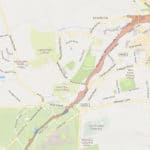An Isle of Wight businessman has been fined tens of thousands of pounds for not complying with planning enforcement notices on his land at Merrie Gardens, in Lake.
Louis William Tudor Smith, of Marlborough Road, was found guilty of breaching Isle of Wight council planning enforcement notices after an eight day trial at the Isle of Wight Crown Court in November.
Six counts of breaching planning notices
Along with his companies Merrie Gardens Ltd and Westover Park Estate Ltd, of which he is a sole director, Smith was charged with six counts of breaching planning notices.
Smith fined £30,000
Today, Thursday 4th January, Smith was fined £30,000 for his non-compliance between October 2020 and April 2021, which he denied.
He will have to pay the fine by 31st January 2025, or he will be jailed for 15 months.
Company fined £30,000
Merrie Gardens Ltd was also fined £30,000 and it will have four years to pay the fine.
Westover Park Ltd was fined £500 and will have a year to pay the fine.
£12,500 for council’s legal costs
Smith and Merrie Gardens will also both have to pay £12,500 towards the council’s legal costs.
In February 2019, Isle of Wight council officers visited the site and found work requiring planning permission had been carried out.
Smith, 72, was ordered to remove waste and regrade land at Merrie Gardens, behind the Premier Inn and KFC off Newport Road in Lake.
Extensive work undertaken without permission
Speaking in court today, Duncan Milne, on behalf of the Isle of Wight council, said extensive work had been undertaken on the site without planning permission.
He pointed to the Planning Inspectorate’s decision in upholding the council’s enforcement notice, that the character of the site had materially changed from agricultural.
A “deliberate flagrant breach”
Mr Milne told Recorder Barry McElduff the fact the land has still not been put right, apart from putting down a daisy seed mix, demonstrates a “deliberate flagrant breach” of the enforcement notice.
He also said there was an “unwillingness” to put the site right as Smith and his companies had the money to do so.
Smith apologised to the court
In his mitigation before sentencing, Smith apologised to the court that his “best efforts to clear the site, in a pandemic and while shielding in the Lake District, were not good enough.”
He said he had cooperated fully with the council and tried to comply with the notice, but the outstanding issue remained “a small piece of offending chalk” and “not good enough reseeding.”
Smith said,
“If the intention of the court is to bankrupt me and liquidate my companies, I suggest you impose a custodial sentence.
“I don’t want this hanging over me for the rest of my life which won’t be very long.”
He said he was very sorry it got to this stage, but was happy to reinstate the land, “if the council can tell me what I have done wrong”.
Claims of co-operation rejected
Mr Milne rejected the claims that Smith had fully co-operated with the council.
Questions were raised about the finances of Smith and his companies and the assets that were held, which were taken into account when the amount of the fine was determined.
Judgement
In his judgement, Recorder McElduff said Smith began developing the land, which he had no permission to do, with the intention of enticing further commercial businesses there.
He said the jury had concluded Smith had not done everything he could to restore the land, in his view, for two reasons — Smith still wanted to develop the land and it would be expensive to “make good the damage that had been done”.
Significant financial benefits
Recorder McElduff said it was an advantage that the land had not been put right and if Smith’s plan had come to fruition it was inevitable there would have been significant financial benefits.
He said significant harm was caused to the environment, animals and the general public by changing the land, and Smith had now admitted a willingness to put it right.
This article is from the BBC’s LDRS (Local Democracy Reporter Service) scheme, which News OnTheWight is taking part in. Some alterations and additions may have been made by OnTheWight. Ed





